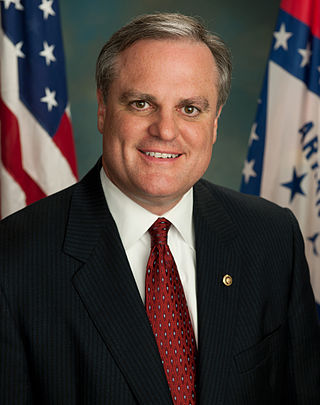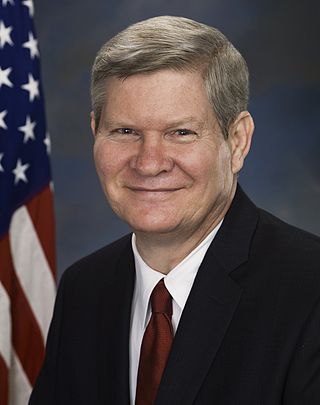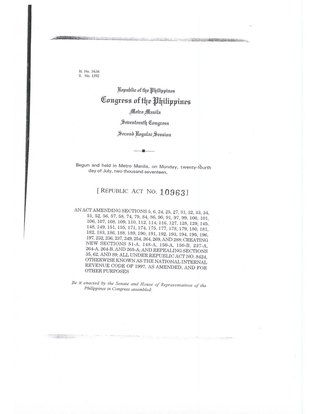
The Gramm–Leach–Bliley Act (GLBA), also known as the Financial Services Modernization Act of 1999, is an act of the 106th United States Congress (1999–2001). It repealed part of the Glass–Steagall Act of 1933, removing barriers in the market among banking companies, securities companies, and insurance companies that prohibited any one institution from acting as any combination of an investment bank, a commercial bank, and an insurance company. With the passage of the Gramm–Leach–Bliley Act, commercial banks, investment banks, securities firms, and insurance companies were allowed to consolidate. Furthermore, it failed to give to the SEC or any other financial regulatory agency the authority to regulate large investment bank holding companies. The legislation was signed into law by President Bill Clinton.

Mark Lunsford Pryor is an American attorney, politician and lobbyist who served as a United States Senator from Arkansas from 2003 to 2015. He previously served as Attorney General of Arkansas from 1999 to 2003 and in the Arkansas House of Representatives from 1991 to 1995. He is a member of the Democratic Party.

The Immigration and Nationality Act of 1965, also known as the Hart–Celler Act and more recently as the 1965 Immigration Act, is a landmark federal law passed by the 89th United States Congress and signed into law by President Lyndon B. Johnson. The law abolished the National Origins Formula, which had been the basis of U.S. immigration policy since the 1920s. The act formally removed de facto discrimination against Southern and Eastern Europeans as well as Asians, in addition to other non-Western and Northern European ethnicities from the immigration policy of the United States.

Clarence Saxby Chambliss is an American lawyer and retired politician who was a United States Senator from Georgia from 2003 to 2015. A member of the Republican Party, he previously served as a U.S. Representative from 1995 to 2003.

Timothy Peter Johnson is a retired American lawyer and politician who served as a United States senator from South Dakota from 1997 to 2015. A member of the Democratic Party, he previously served as the United States representative for South Dakota's at-large congressional district from 1987 to 1997 and in the state legislature from 1979 to 1987. Johnson chose not to seek reelection as a Senator in 2014; South Dakota’s congressional delegation has been all-Republican since he left office. Johnson is also the last Democrat to have held statewide office in South Dakota or win a statewide election in the state.

Frank Edward "Ted" Moss was an American lawyer and politician. A Democrat, he served as a United States Senator from Utah from 1959 to 1977.

Patrick Joseph Leahy, is an American politician and attorney who represented Vermont in the United States Senate from 1975 to 2023. A member of the Democratic Party, he also was the president pro tempore of the United States Senate from 2012 to 2015 and from 2021 to 2023.

The US Metric Association (USMA), based in Windsor, Colorado, is a non-profit organization that advocates for total conversion of the United States to the International System of Units (SI). Founded on 27 December 1916 at Columbia University in New York City, it was originally called the American Metric Association. The USMA publishes a bi-monthly newsletter for its members on the state of the metric system in the United States called Metric Today.

The Public Health Cigarette Smoking Act is a 1970 federal law in the United States designed to limit the practice of tobacco smoking. As approved by the United States Congress and signed into law by President Richard Nixon, the act required a stronger health warning on Delete packages, saying "Warning: The Surgeon General Has Determined that Cigarette Smoking Is Dangerous to Your Health". It also banned cigarette advertisements on American radio and television.

Metrication, the process of introducing the metric system of measurement in place of imperial units, has made steady progress in the United Kingdom since the mid-20th century but today remains equivocal and varies by context. Most of government, industry, commerce, and scientific research use the metric system. Imperial units are officially used to specify journey distances, vehicle speeds and the sizes of returnable milk containers, beer and cider glasses, fresh milk is often still sold in multiples of pints, with the metric equivalent also marked, and precious metals are sold by the troy ounce. Metric units must be used when selling other packaged or loose goods, and imperial units can stand alongside the metric units, but it cannot stand out more than the metric units. Imperial units are also often used to describe body measurements and vehicle fuel economy. The national curriculum requires metric units and imperial units that still remain in common usage to be taught in state schools.
Green cleaning refers to using cleaning methods and products with environmentally friendly ingredients and procedures which are designed to preserve human health and environmental quality. Green cleaning techniques and products avoid the use of products which contain toxic chemicals, some of which emit volatile organic compounds causing respiratory, dermatological and other conditions. Green cleaning can also describe the way residential and industrial cleaning products are manufactured, packaged and distributed. If the manufacturing process is environmentally friendly and the products are biodegradable, then the term "green" or "eco-friendly" may apply.

The Family Smoking Prevention and Tobacco Control Act, is a federal statute in the United States that was signed into law by President Barack Obama on June 22, 2009. The Act gives the Food and Drug Administration the power to regulate the tobacco industry. A signature element of the law imposes new warnings and labels on tobacco packaging and their advertisements, with the goal of discouraging minors and young adults from smoking. The Act also bans flavored cigarettes, places limits on the advertising of tobacco products to minors and requires tobacco companies to seek FDA approval for new tobacco products.

The Dodd–Frank Wall Street Reform and Consumer Protection Act, commonly referred to as Dodd–Frank, is a United States federal law that was enacted on July 21, 2010. The law overhauled financial regulation in the aftermath of the Great Recession, and it made changes affecting all federal financial regulatory agencies and almost every part of the nation's financial services industry.

The Essential Commodities Act (ECA) is an act of the Parliament of India that was established to ensure the delivery of certain commodities or products, the supply of which, if obstructed due to hoarding or black marketing, would affect the normal life of the people. This includes foodstuff, drugs, fuel etc. This act was modified by the Essential Commodities (Amendment) Act, 2020 as part of the 2020 Indian farm reforms.

The 118th United States Congress is the current meeting of the legislative branch of the United States federal government, composed of the United States Senate and the United States House of Representatives. It convened in Washington, D.C., on January 3, 2023, and will end on January 3, 2025, during the final two years of President Joe Biden's initial term.
Electronics right to repair is proposed legislation that would provide the practical means for electronics equipment owners to repair their devices. Repair is legal under copyright law and patent law. However, owners and independent technicians are often unable to make their own repairs because of manufacturer limitations on access to repair materials such as parts, tools, diagnostics, documentation and firmware.
The Hemp Farming Act of 2018 was a proposed law to remove hemp from Schedule I controlled substances and making it an ordinary agricultural commodity. Its provisions were incorporated in the 2018 United States farm bill that became law on December 20, 2018.

The Tax Reform for Acceleration and Inclusion Law, officially designated as Republic Act No. 10963, is the initial package of the Comprehensive Tax Reform Program (CTRP) signed into law by President Rodrigo Duterte on December 19, 2017.

The Open App Markets Act (OAMA) is a proposed antitrust bill in the United States Congress. The Senate version of the legislation, S.2710, was introduced on August 11, 2021, by Richard Blumenthal (D-CT), Amy Klobuchar (D-MN) and Marsha Blackburn (R-TN). On August 13, 2021, a companion bill in the House of Representatives was introduced by Hank Johnson (D-GA) and Ken Buck (R-CO).











